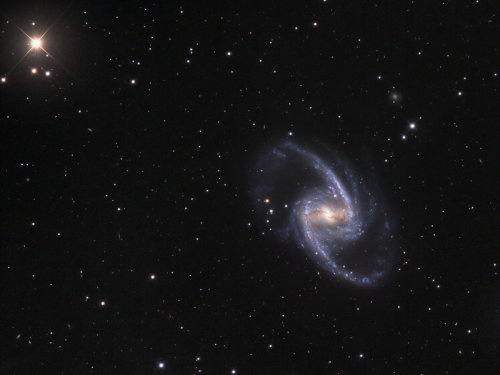Chris-z-2135-46-blog - Space Travel

More Posts from Chris-z-2135-46-blog and Others


Trillions and Trillions
As far as astronomers know, this universe of ours is nearly 14 billion years old and 93 billion light-years across. Only objects between 10 to 12 billion light-years distant will ever be visible due to the expansion of the universe.
Recently, a new survey upped the believed galactic population from around 100 billion to TWO TRILLION.
Images: Left: NGC 1365 Credit: Jason Jennings Right: Hubble Deep Field added to the background of NGC 1365 Credit: NASA/ESA


One of 7 ways a trip to Mars could kill you
1) Your rocket could blow up before leaving Earth
Elon Musk’s plan to go to Mars involves strapping a giant spaceship atop the biggest rocket that humanity has ever built. Because any rocket launch basically involves a long, controlled explosion, it’s inherently precarious — no matter how many safety tests are done beforehand. If anything goes wrong, if the explosion gets out of control, the people strapped to that big container of fuel don’t stand a chance.
For context, NASA’s space shuttle program carried 833 passengers between 1981 and 2011. Of those, 14 people died in explosions on two high-profile accidents (Challenger and Columbia), a fatality rate of 1.6 percent. That’s vastly more dangerous than driving and a bit riskier than climbing Mount Everest. (The fatality rate for the Apollo program to the moon was even higher, at 9 percent.)
But, of course, SpaceX would be using newer, more complex, and yet-untested rockets to get to Mars. So it’s tough to say what the actual odds of death would be. Possibly much higher! Note that a couple of SpaceX’s smaller Falcon 9 rockets have either exploded on the launchpad or blown up mid-flight. Engineers and rocket scientists can improve that, but it’s unlikely that the risk will be zero.

Pepacton Reservoir is one of the darkest areas of the tri-state area. By contrast the city is serves is one of the brightest; New York.
js




If at first you don’t succeed…
SpaceX lands its “reusable” rocket on an ocean barge FOR THE FIRST TIME EVER.
When the bass drops
Gimme fuel

18420 second exposures stacked to give whirling effect
js
Why Sequencing DNA in Space is a Big Deal
… And How You Can Talk to the Scientists Who Made It Happen

Less than one month ago, DNA had never been sequenced in space. As of today, more than one billion base pairs of DNA have been sequenced aboard the International Space Station, Earth’s only orbiting laboratory. The ability to sequence the DNA of living organisms in space opens a whole new world of scientific and medical possibilities. Scientists consider it a game changer.

NASA astronaut Kate Rubins, who has a background in genomics, conducted the sequencing on the space station as part of the Biomolecule Sequencer investigation. A small, commercial, off-the-shelf device called MinION (min-EYE-ON), manufactured by Oxford Nanopore Technologies in the UK, was used to sequence the DNA of bacteria, a virus and rodents. Human DNA was not sequenced, and there are no immediate plans to sequence human DNA in space.

(Image Credit: Oxford Nanopore Technologies)
The MinION is about the size of a candy bar, and plugs into a laptop or tablet via USB connection, which also provides power to the device. The tiny, plug and play sequencer is diminutive compared to the large microwave-sized sequencers used on Earth, and uses much less power. Unlike other terrestrial instruments whose sequencing run times can take days, this device’s data is available in near real time; analysis can begin within 10-15 minutes from the application of the sample.

Having real-time analysis capabilities aboard the space station could allow crews to identify microbes, diagnose infectious disease and collect genomic and genetic data concerning crew health, without having to wait long periods of time to return samples to Earth and await ground-based analysis.
The first DNA sequencing was conducted on Aug. 26, and on Sept. 14, Rubins and the team of scientists back at NASA’s Johnson Space Center in Houston hit the one-billionth-base-pairs-of-DNA-sequenced mark.

Have more questions about how the Biomolecule Sequencer works, or how it could benefit Earth or further space exploration? Ask the team of scientists behind the investigation, who will be available for questions during a Reddit Ask Me Anything on /r/science on Wednesday, Sept. 28 at 2 p.m. EDT.
The participants are:
Dr. Aaron Burton, NASA Johnson Space Center, Planetary Scientist and Principal Investigator
Dr. Sarah Castro-Wallace, NASA Johnson Space Center, Microbiologist and Project Manager
Dr. David J. Smith, NASA Ames Research Center, Microbiologist
Dr. Mark Lupisella, NASA Goddard Space Flight Center, Systems Engineer
Dr. Jason P. Dworkin, NASA Goddard Space Flight Center, Astrobiologist
Dr. Christopher E. Mason, Weill Cornell Medicine Dept. of Physiology and Biophysics, Associate Professor
I would like to die on Mars. Just not on impact.
Elon Musk




SpaceX Lands the Falcon9 First Stage - A revolution in Rocket Science and Engineering
Today, at 8:33, Spacex made history. They landed the first stage of their Falcon9 rocket after having it successfully deploy a second stage into low earth orbit.
The Video is here:
Unlike other rocket companies, Spacex in not making small hops - they did that 2 years ago with their grasshopper rocket. In fact, this is how they tested the initial avionics systems that would be able to land the rocket in a stable position autonomously. Here is some footage:
Unlike the companies that make these hops, Spacex has to use this stage to help get payloads into low earth orbit… and then recover it! This is incredibly difficult and requires an advanced retro-thrusting maneuver that has never been successful - until now! The diagram below shows this thrusting maneuver, which happens shortly after the second stage has decoupled and ignited.

Spacex claims that this is similar to throwing a pencil over the Empire State Building, then having it flip perfectly, then haveing it fall into a shoebox… easy enough right?

Only, in real life SpaceX isn’t shooting a pencil… they are shooting a rocket! This is the pad that the now famous falcon9 rocket landed on:

Now you might ask, why does this matter? This means space will become cheaper! We can already build satellites that are less than $10,000, as a matter of fact I’m building a small satellite with a team right now! As it currently stands, space travel is too expensive for creative people to take risks. Now, thanks to SpaceX, we may be mining or visiting asteroids, visiting the moon, visiting mars, or doing something crazier - and we may be doing this very soon! The Falcon9 rocket costs $54 million to build but only $200,000 to refuel… let’s put this in perspective… That’s the same amount that it costs to refuel a Boeing 747 (which is the airplane that consumers use to fly around the world). This means that space travel could be as cheap as air travel very soon! Way to go SpaceX!
If you want to watch the full launch and landing video check it out here (this may be moved in the future): http://www.spacex.com/webcast/

Credit: SpaceX
-
 cold-beer-conversation liked this · 5 years ago
cold-beer-conversation liked this · 5 years ago -
 sweetexpertblaze2 liked this · 8 years ago
sweetexpertblaze2 liked this · 8 years ago -
 sweetexpertblaze2 reblogged this · 8 years ago
sweetexpertblaze2 reblogged this · 8 years ago -
 cruz-world liked this · 8 years ago
cruz-world liked this · 8 years ago -
 joserubenrr-blog liked this · 8 years ago
joserubenrr-blog liked this · 8 years ago -
 douglav3 liked this · 8 years ago
douglav3 liked this · 8 years ago -
 halffmad liked this · 8 years ago
halffmad liked this · 8 years ago -
 random-machines liked this · 8 years ago
random-machines liked this · 8 years ago -
 abrar-akash-blog liked this · 8 years ago
abrar-akash-blog liked this · 8 years ago -
 beyourself2020 reblogged this · 8 years ago
beyourself2020 reblogged this · 8 years ago -
 burningradio reblogged this · 8 years ago
burningradio reblogged this · 8 years ago -
 annalindastarhederer liked this · 8 years ago
annalindastarhederer liked this · 8 years ago -
 x-15 reblogged this · 8 years ago
x-15 reblogged this · 8 years ago -
 roobri3 liked this · 8 years ago
roobri3 liked this · 8 years ago -
 fastkid23 liked this · 8 years ago
fastkid23 liked this · 8 years ago -
 maximamore-blog liked this · 8 years ago
maximamore-blog liked this · 8 years ago -
 vulpes-aestatis reblogged this · 8 years ago
vulpes-aestatis reblogged this · 8 years ago -
 choppyblue liked this · 8 years ago
choppyblue liked this · 8 years ago -
 alchemistsophie liked this · 8 years ago
alchemistsophie liked this · 8 years ago -
 littlewickedd-remade-blog reblogged this · 8 years ago
littlewickedd-remade-blog reblogged this · 8 years ago -
 brass-wafer reblogged this · 8 years ago
brass-wafer reblogged this · 8 years ago -
 josephvsn reblogged this · 8 years ago
josephvsn reblogged this · 8 years ago -
 trial-sized reblogged this · 8 years ago
trial-sized reblogged this · 8 years ago -
 asterhisk reblogged this · 8 years ago
asterhisk reblogged this · 8 years ago -
 clearlyscrumptiousbasement-blog liked this · 8 years ago
clearlyscrumptiousbasement-blog liked this · 8 years ago -
 msmrangidan liked this · 8 years ago
msmrangidan liked this · 8 years ago -
 jameslegendary reblogged this · 8 years ago
jameslegendary reblogged this · 8 years ago -
 skipnchurch liked this · 8 years ago
skipnchurch liked this · 8 years ago -
 iveagixxer reblogged this · 8 years ago
iveagixxer reblogged this · 8 years ago -
 iveagixxer liked this · 8 years ago
iveagixxer liked this · 8 years ago -
 golfguy0904 reblogged this · 8 years ago
golfguy0904 reblogged this · 8 years ago